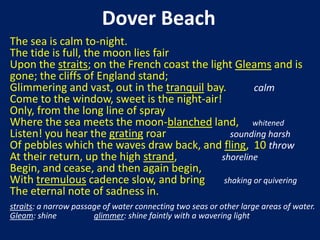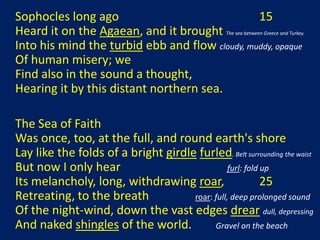Dover Beach
- 1. DOVER BEACH Matthew Arnold Dr. M. Fahmy Raiyah
- 2. THE POET Matthew Arnold (1822-1888)
- 3. Dover Beach The sea is calm to-night. The tide is full, the moon lies fair Upon the straits; on the French coast the light Gleams and is gone; the cliffs of England stand; Glimmering and vast, out in the tranquil bay. calm Come to the window, sweet is the night-air! Only, from the long line of spray Where the sea meets the moon-blanched land, whitened Listen! you hear the grating roar sounding harsh Of pebbles which the waves draw back, and fling, 10 throw At their return, up the high strand, shoreline Begin, and cease, and then again begin, With tremulous cadence slow, and bring shaking or quivering The eternal note of sadness in. straits: a narrow passage of water connecting two seas or other large areas of water. Gleam: shine glimmer: shine faintly with a wavering light
- 4. Sophocles long ago 15 Heard it on the Agaean, and it brought The sea between Greece and Turkey. Into his mind the turbid ebb and flow cloudy, muddy, opaque Of human misery; we Find also in the sound a thought, Hearing it by this distant northern sea. The Sea of Faith Was once, too, at the full, and round earth's shore Lay like the folds of a bright girdle furled. Belt surrounding the waist But now I only hear furl: fold up Its melancholy, long, withdrawing roar, 25 Retreating, to the breath roar: full, deep prolonged sound Of the night-wind, down the vast edges drear dull, depressing And naked shingles of the world. Gravel on the beach
- 5. Ah, love, let us be true To one another! for the world, which seems 30 To lie before us like a land of dreams, So various, so beautiful, so new, Hath really neither joy, nor love, nor light, Nor certitude, nor peace, nor help for pain; And we are here as on a darkling plain dark Swept with confused alarms of struggle and flight, Where ignorant armies clash by night.
- 6. Explanation The first stanza opens with a happy mood. The speaker invites his beloved to come to the window to enjoy with him the calm sea and the sweet air on a beautiful night. The speaker, however, cannot resist the sadness that he feels by the repetitive sound of the waves on the shore pebbles. The sound reminds the speaker of the ever-changing fortunes of people. In the second stanza, the speaker imagines that the same sound heard by the Greek dramatist Sophocles made him think of the recurrence of human suffering.
- 7. In the third stanza, the speaker compares the receding waves to the decay of spiritual faith. Religion that used to be like a sash or belt, surrounding humanity and protecting it from doubt and despair, is now removed, leaving behind a faithless humanity. In the fourth stanza, the speaker turns to his beloved, saying that it is in our sincerity and love that we can find solace in a world full of deception and uncertainty.
- 8. FORM Elegy: Arnold's "Dover Beach" is considered an elegy lamenting the world's loss of religious faith, during a time of progress in science and industry. Dramatic Monologue: Matthew Arnold's "Dover Beach" is a dramatic monologue because the poet is addressing a silent audience. The effect is of one person directly addressing another, while the reader listens in.
- 9. Stanza form: The poem is divided into 4 stanzas. Free Verse: The poem is written in free verse with no particular meter or rhyme scheme, although some of the words do rhyme.
- 10. THEME Decline of Religious Faith in the Modern World In Arnold’s world, religious faith was receding under the impact of modern materialism, the industrial revolution, and the new scientific ideas such as the theory of evolution. Consequently, spiritual values and religious beliefs were cast in doubt. Arnold laments the dying of the light of faith, symbolized by the gleaming light on the French coast. To his ears, the sound of the waves become the "melancholy, long, withdrawing roar" of the Sea of Faith. The receding waters leave behind a world bereft of any spiritual values, a world which offers: "Nor certitude, nor peace, nor help for pain."











